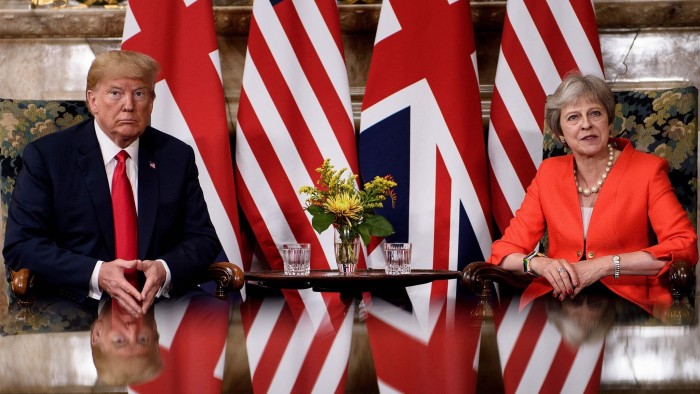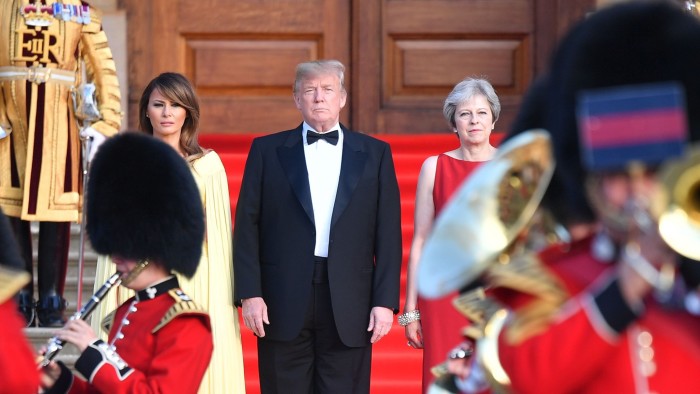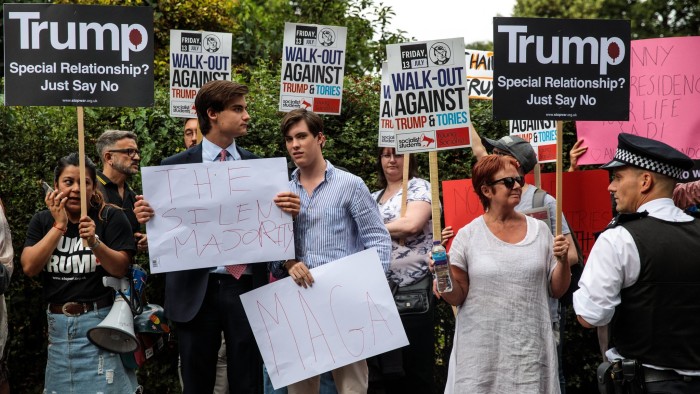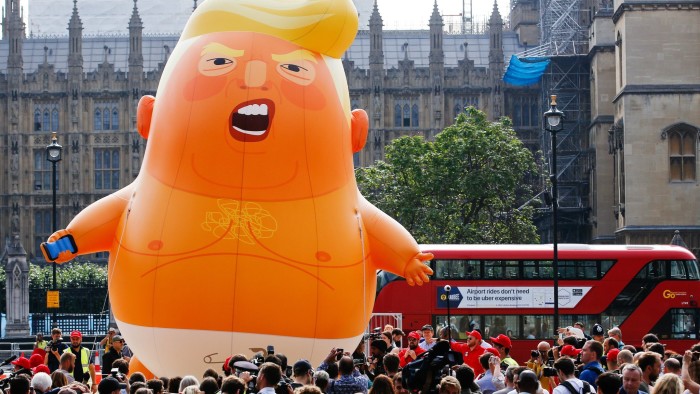Trump says Brexit blueprint likely to ‘kill’ any UK-US trade deal

Simply sign up to the US trade myFT Digest -- delivered directly to your inbox.
US President Donald Trump has begun his first official visit to Britain with an undiplomatic barrage against Theresa May, saying the prime minister’s Brexit blueprint “will probably kill” any trade deal between the two allies.
“If they do a deal like that, we would be dealing with the EU instead of dealing with the UK, so it will probably kill the deal,” Mr Trump told the Sun newspaper. Mr Trump also criticised her handling of the Brexit talks as “very unfortunate”.
In a comment that will be unwelcome in Downing Street, he said Boris Johnson “would be a great prime minister”. On Monday, Mr Johnson resigned as foreign secretary in protest at the Brexit plan and could yet launch a leadership challenge.
Mrs May was already facing significant political criticism for hosting Mr Trump in Britain, where he arrived on Thursday for a three-day visit. Mr Trump and his aides had previously said the UK would have priority in terms of a trade deal once the conditions of its departure from the EU allowed for negotiations.
The prospect of a speedy trade deal had been a significant factor in Mrs May’s decision to invite Mr Trump to the UK. At a dinner with the president, and government and business leaders on Thursday night at Blenheim Palace, she again tried to push the matter, heralding the opportunity “to tear down the bureaucratic barriers that frustrate business leaders on both sides of the Atlantic”.
American presidents have come under criticism for intervening in domestic political issues in Britain, including in 2016 when then-President Barack Obama warned the UK would go to the “back to the queue” for trade negotiations if it left the EU. But such intrusions have normally been aimed at shoring up the incumbent government, rather than intentionally undermining it.
“It is not the act of an ally or special relationship,” said Thomas Wright, a foreign policy expert at the Brookings Institution. “It is a predatory policy towards Brexit Britain that is designed to take advantage of their vulnerability and need for trade deals.”
US officials almost immediately attempted to repair the damage, with Sarah Sanders, the White House press secretary, insisting Mr Trump “likes and respects Prime Minister May very much”.
“As he said in his interview with the Sun she ‘is a very good person’ and he ‘never said anything bad about her’. He thought she was great on Nato, and is a really terrific person,” Ms Sanders said. “He is thankful for the wonderful welcome from the prime minister here in the UK.”

After his arrival on Friday at Chequers, the UK prime minister’s country residence, Mr Trump told reporters that the US-UK relationship was “very, very strong”. He said the two leaders had talked for 90 minutes the previous evening, and would talk about trade on Friday.
One business leader who went to the Blenheim Palace dinner said the president had not said anything controversial at the event: “He was oddly diplomatic; [there was] no Brexit talk and lots of history chat about Churchill.”
The British government also appeared to be adopting a strategy of playing down the interview rather than standing up to Mr Trump. A Number 10 spokeswoman said on Friday that Mrs May was looking forward to talking to Mr Trump at Chequers, saying she would explain the contents of the Brexit white paper to the US president.
“She’s looking forward to discussing a wide range of issues with him including trade and the prime minister will have an opportunity to bring him up to speed with our latest Brexit thinking following the white paper publication yesterday.”
She said Downing Street remained optimistic of getting a trade deal with the US after Brexit, saying London did not have a “binary choice” between the Brussels and Washington: “We’re looking forward to building a deep and special partnership with the EU and an ambitious and confident trade deal with the US.”
Despite the effort, Mr Trump’s remarks riled British politics on Friday. Simon Fraser, a former permanent secretary at the Foreign Office, wrote on Twitter that while he was originally “unenthusiastically” in favour of a presidential visit to the UK, Mr Trump’s “patronising put-down of @theresa_may is wholly outrageous, whatever your view of her, her government or her handling of #Brexit.”
Mr Trump’s enthusiastic support for Mr Johnson, once seen as Mrs May’s strongest challenger for Conservative party leader, is likely to be particularly difficult for the prime minister. Mr Trump told the Sun he agreed with Mr Johnson’s desire for a hard negotiating line with the EU. “I would have done it much differently. I actually told Theresa May how to do it but she didn’t agree, she didn’t listen to me.”

He added that “she probably went the opposite way” and that “the deal she is striking is a much different deal than the one the people voted on”.
Iain Duncan Smith, the Eurosceptic former Tory leader who is close to Mr Trump’s national security adviser John Bolton, dismissed speculation he had persuaded the Trump camp to turn against her Brexit plan.
“It’s a ludicrous supposition,” he told the Financial Times. “Just because we have been friends for 26 years and we talk regularly doesn’t mean that I have that much influence. I don’t get the impression that anyone can tell President Trump what to think.”
Mr Trump’s comments followed a tense two-day Nato summit in Brussels where the US president stunned his fellow allies with a string of attacks, particularly against Germany and its chancellor, Angela Merkel.
“I am sure this infuriates almost everybody in Britain,” said Gary Hufbauer, a trade expert at the Peterson Institute for International Economics. “He has managed to step on more toes in his brief trip to the UK, which was supposed to be a love-in after Nato.”
Mrs May concedes that her Brexit plan, which involves continuing alignment with EU rules on goods, would restrict the scope for trade deals. But a government white paper on Thursday said that, after leaving the EU, Britain could still “strike new trade deals around the world, in particular breaking new ground for agreements in services”.
Mr Trump’s comments differed from less confrontational remarks he made earlier on Thursday in Brussels where he said it was “not for me to say” if Mrs May was taking the correct approach.

Asked at Nato headquarters whether he thought the UK should pursue a hard Brexit, Mr Trump said: “Brexit is Brexit . . . The people voted to break it up, so I would imagine that’s what they’ll do, but maybe they’re taking it a little bit of a different route. So, I don’t know if that’s what they voted for. I just want the people to be happy.”
On Friday morning, Mr Trump and his wife Melania flew on Marine One, the presidential helicopter, from Winfield House, the US ambassador’s residence in central London, to the Royal Military Academy at Sandhurst where they witnessed a joint military exercise.
They then flew to Chequers, where the leaders have met and will hold a joint news conference.
In his Sun interview, Mr Trump also renewed his attacks on Sadiq Khan, London’s first Muslim mayor, who he said had done a “very bad job on terrorism”. As Mr Trump prepared to arrive in the UK, Mr Khan urged protesters to avoid violence while at the same time offering an indirect criticism of the US president.
“Having a special relationship means that we expect the highest standards from each other, and it also means speaking out when we think the values we hold dear are under threat,” Mr Khan said.
On Friday, tens of thousands of Britons are expected to demonstrate against Mr Trump in central London, where protesters have suspended a large inflatable balloon depicting Mr Trump as an angry baby.
A “Human Rights Nightmare” banner has also been unfurled by Amnesty International activists across the river Thames on Vauxhall Bridge in London.
At the Nato news conference, however, Mr Trump said: “I think they like me a lot in the UK.” A recent YouGov poll found that Mr Trump’s favourability rating in the UK was minus 60.
Follow Demetri Sevastopulo and Henry Mance on Twitter: @dimi and @henrymance
Comments